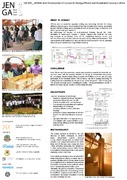| dc.contributor.author | Tusubira, Y. | |
| dc.contributor.author | Kateega, J. | |
| dc.contributor.author | Kigozi, J | |
| dc.date.accessioned | 2017-02-28T09:33:47Z | |
| dc.date.available | 2017-02-28T09:33:47Z | |
| dc.date.issued | 2016 | |
| dc.identifier.citation | Tusubira, Y., Kateega, J. & Kigozi, J. (2016). Joint development of courses for energy efficient and sustainable housing in Africa (JENGA), Uganda. Poster paper presented at the Sustainable Future Conference(SFC2016), Architecture and Construction in the Global South. 31 Aug.- 2 Sep., Nairobi, Kenya. | en_US |
| dc.identifier.uri | http://hdl.handle.net/20.500.12280/437 | |
| dc.description.abstract | The JENGA project was intended to develop courses for energy efficiency and Sustainable housing in Africa. Uganda Martyrs University (UMU) as one of the partner universities, had over 100 students participating in the program over the past three years. These Students were involved in six major projects through formal course activities, research initiatives, cross cultural site exercises as well as actual construction. These activities enabled the students to exchange knowledge and share ideas on the practice based learning platform for a better understanding of sustainable construction. The project activities included:
Poured Earth Wall Construction: This was done with the aim of enhancing students’ appreciation of the different applications of earth construction. The workshop involved a team of students from UMU students from JKUAT and UMU, to construct the complex. The project explored the use of locally sourced materials such as bamboo for structural roof system and door panes, Earth and reeds for thermal insulation. The project also explored various energy efficient and waste management systems.
FoBE Display Space: This is part of an ongoing designbuild project where students were tasked to design and eventually construct a Display Space building, offering them hands-on experience through the entirety of a building project. There are three main themes for design-build projects within the JENGA program: flood, stack and slope. This project design and University of Rwanda, College for Sciences and Technology. They constructed four poured earth walls (450mmx1100mmx1000mm) to examine different aspects of batch, moisture retention and resistance; as well as test the structural strength by crushing cube samples.
Skills Centre Nairobi: This was a hands on construction exercise initiated by the University of Applied Sciences Augsburg, German in collaboration with Promoting Africa, to construct a Skills Centre complex for the youth of Mathare Valley. Mathare is the second largest slum in Nairobi and this Skills Centre was intended to offer opportunities to develop marketable craftsman skills to improve employability of the community residents who might have missed formal learning opportunities. Engineering students from the University of Applied Sciences Augsburg partnered with architecture responds to ‘slope’ as is with the topographic nature of the site. Students have thus far been engaged in the design phase and site preparation.
Promotion of Eco Friendly Construction Technologies for Informal Settlements: This exercise engaged students in the making of garbage banks using Interlocking Stabilised Soil Blocks (ISSB) in Namuwongo, a suburban informal settlement community in Kampala. This was done with an aim of providing a cost-effective waste management alternative with eco-friendly construction technology. With this, the students got well versed with ISSB technology, its production, construction and cost related implications. | en_US |
| dc.language.iso | en | en_US |
| dc.publisher | Architecture and Construction in the Global South | en_US |
| dc.subject | Courses for energy | en_US |
| dc.subject | Sustainable housing in Africa | en_US |
| dc.title | Joint development of courses for energy efficient and sustainable housing in Africa (JENGA), Uganda | en_US |
| dc.title.alternative | Poster paper presented at the Sustainable Future Conference(SFC2016) | en_US |
| dc.type | Other | en_US |


